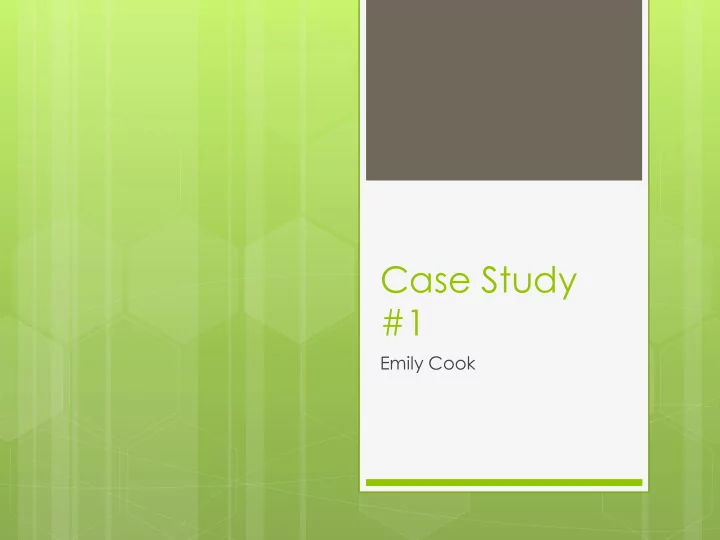

Case Study #1 Emily Cook
Client Profile Glenda is pregnant with her third child and came into the WIC clinic for her initial WIC certification in July. Today (October) she is here for her F3 appointment and she is 21 weeks along. She plans to BF this baby because she was successful with her first and second times for 12 mo and 11 mo, respectively
Client Profile Glenda reports that her MD diagnosed her with gestational diabetes (GDM) and hypertension (HTN) during the first pregnancy in 2010, so she thinks she must have GDM during this one, too. Because of the education she received about GDM during her first pregnancy, she is carb-counting and generally following a gestational diabetic diet, but hasn’t had a glucose tolerance test or been started on meds yet.
Question 1 What risk(s) do you think TWIST would assign this client?
Question 1 Answer What risk(s) do you think TWIST would assign this client? Answer: 303-Medium (Hx of GDM)
Question 2 What risk(s) would a certifier assign this client?
Question 2 Answer What risk(s) would a certifier assign this client? Answer: None
Question 3 What, if any, documentation is required?
Question 3 Answer What, if any, documentation is required? Answer: None, however it would be nice to have progress notes regarding hx of GDM & HTN from first pregnancy & info on client’s current diet habits
Question 4 What type of education would you give during the appointment in October?
Question 4 Answer What type of education would you give during this appointment in October? Answer: GDM & HTN prevention diets.
Question 5 Does this client need to see the RD?
Question 5 Answer Does this client need to see the RD? Answer: No
Question 6 What are the next steps with this client?
Question 6 Answer What are the next steps with this client? Answer: Schedule her into the Baby Talk Class
Case Study #2 Emily Cook
Client Profile New client Dorothy, 2 year 3 month old child comes in to clinic with history of kidney reflux. Currently, her caregivers are monitoring the condition but it isn’t too bad. She was previously on daily antibiotics, but is off all meds now. When the kidney reflux flares up, Dorothy presents with fever and gets “really sick.” Dorothy sees a specialist every 1-2 months because another family member was recently diagnosed with renal failure.
Client Profile Dorothy is a good eater but Mom reports she doesn’t like sweets or eggs. She has 2 big meals each day and snacks 2-3 times between each meal, mostly on fruit. She drinks 4 cups of juice with ice, and 2 cups of milk each day.
Question 1 What risk(s) do you think TWIST would assign this client?
Question 1 Answer What risk(s) do you think TWIST would assign this client? None.
Question 2 What risk(s) would a certifier assign this client?
Question 2 Answer What risk(s) would a certifier assign this client? 346-Renal Disease
Question 3 What, if any, documentation is required?
Question 3 Answer What, if any, documentation is required? What type of renal disease Dorothy has and her current tx plan.
Question 4 What type of education would you give this client?
Question 4 Answer What type of education would you give this client? Reducing juice, limiting snacks to 1 between meals so she’s hungry at meal times.
Question 5 Does this client need to see the RD?
Question 5 Answer Does this client need to see the RD? Yes.
Question 6 What are the next steps with the client?
Question 6 Answer What are the next steps with the client? FD with RD
Case Study #3 Emily Cook
Client Profile Emmy comes into the clinic at 29 weeks for an NP appointment. She just found out she was pregnant last month. Per PN questionnaire, the client has depression, a fish allergy, lactose sensitivity, HPV, and herpes. She was assigned the following risks: lack of or inadequate prenatal care, infectious diseases, food allergies, and lactose intolerance.
Question 1 Were these risks appropriately assigned? If not, what would you change or add?
Question 1 Answer Were these risks appropriately assigned? If not, what would you change or add? No, she does not have an infectious disease — herpes is contagious but not infectious. Note: food allergies and lactose intolerance have to be MD Dx (so certifier will need to clarify this with client)
Question 2 What, if any, type of documentation is required?
Question 2 Answer What, if any, type of documentation is required? What foods she is allergic to. No risk for HPV and herpes, but certifier will still need to document in Progress Notes.
Question 3 What type of education would you provide her?
Question 3 Answer What type of education would you provide her? Establishing PN care if is hasn’t been already. Meeting her calcium needs if she limits milk because of lactose sensitivity.
Question 4 Which food package is appropriate for this client?
Question 4 Answer Which food package is appropriate for this client? Lactaid milk.
Question 5 Does this client need to be referred to the RD?
Question 5 Answer Does this client need to be referred to the RD? No.
Recommend
More recommend